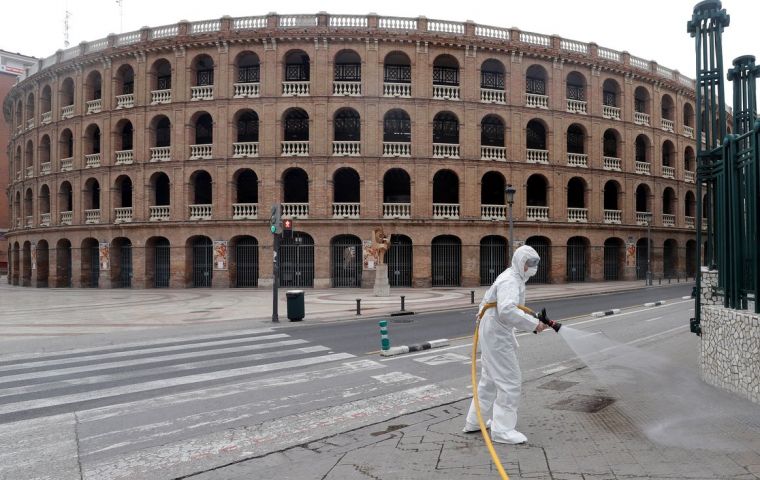MercoPress. South Atlantic News Agency
Spain's bullfighting industry on the cliff: virus sending the bulls to the abattoirs instead of the rings
 The nationwide lockdown imposed in Spain have spelt disaster for the bullfighting season, which runs from March to October.
The nationwide lockdown imposed in Spain have spelt disaster for the bullfighting season, which runs from March to October. For Spain's majestic fighting bulls whose final hours draw thousands to bullrings every year, the blow has been deadly: With the virus decimating the season, many are now condemned to the abattoir.
Bullfighting has long been a lightning-rod issue, pitting animal rights activists who argue that the practice is cruel and should banned against traditionalists who say it should be preserved as a vital part of cultural heritage.
Whatever the ethical issues, bullfighting thrives only when there are huge crowds to watch the spectacle involving a burly, half-ton beast whose upkeep is costly and whose lifespan is limited.
“It's a disaster for bullfighting,” Juan Pedro Domecq Morenes said from his Lo Alvaro breeding farm in the southern Andalucia region, who had bulls entered in five fights cancelled in the last few weeks.
The nationwide lockdown imposed to slow the spread of the epidemic, under which the nation's 47 million population has been forced to stay home, and the social distancing to come in the next few months have spelt disaster for the bullfighting season, which runs from March to October.
Everyone is out of work, from the bullfighters to the banderilleros who throw colored darts and the mounted riders who carry lances. Both breeders and businessmen describe the shutdown as a catastrophe for a sector that puts on 20,000 events a year, both fights and street festivals.
But the viability of these prized animals as fighters is short-lived: to enter the arena as a “toro bravo” they can be no more than six years old - or seven to join a street festival.
Raising a fighting bull costs a breeder between 4,000 and 5,000 Euros (US$4,400 and US$5,500), but 90 per cent of the investment can be recouped by selling him for a show. But if the bull ends up being sold to the slaughterhouse, breeders will only see a 10% return on investment, a ruinous alternative but the only option if they don't want to keep on feeding an animal they can no longer rely on to turn a profit.
In a statement, the Union of Fighting Bull Breeders, which represents some 345 breeding ranches, said the industry could lose more than 77 million Euros.And it could have “a devastating effect” on bull breeding farms, which generate thousands of jobs both direct and indirect in sparsely populated areas of rural Spain, the union said.
From a business perspective, the situation is “quite drastic”, says Simon Casas, a former French matador who runs the bullrings in Madrid, Valencia and Alicante and is president of ANOET, a national association representing bullfight organizers.




Top Comments
Disclaimer & comment rulesCommenting for this story is now closed.
If you have a Facebook account, become a fan and comment on our Facebook Page!